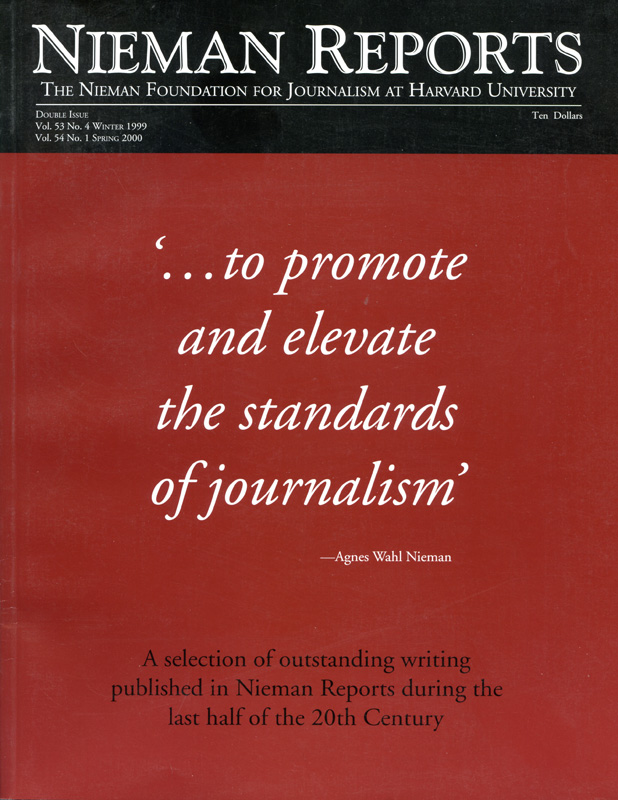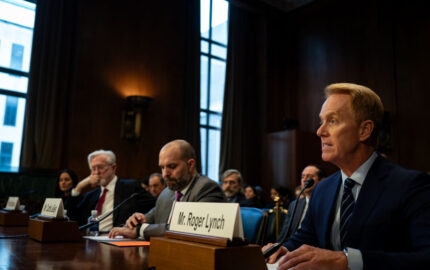
[This article originally appeared in the Summer 1981 issue of Nieman Reports.]
I’ve been asked to say something about Walter Lippmann. There would be no Niemans without him; I don’t think American journalism would be as good as it is—and it’s not as good as it ought to be—without him. I’ll try to tell you what I think he contributed.
When Walter Lippmann was dying in a nursing home in New York, my wife (who is a schoolteacher) and I would visit him two or three times a week. Once I asked him, “What’s wrong with this country; why doesn’t it work?”
He answered, “We have lost our comity.”
I went to the dictionary and looked that up because it’s not a word you hear very often. (It means social harmony.) Democracy only works when you have gentlemen and ladies, Lippmann felt.
Modern Americans have a kind of adversarial disease which, when controlled, works. When out of control, which I suggest it may be, we have battles between the First Amendment and the Sixth Amendment, battles between those who want to do something for poor people and those who want to do something about inflation. We’ve reached the point where there is such a lack of comity, to borrow from Lippmann, that the very thing we prize the most, the democratic system, may not be working.
And what’s that got to do with journalism? Everything.
I’m so old I can remember when there was no such thing as radio. We lived on 110th Street in New York. In 1922 my father—I can remember because it was the year of the Dempsey- Carpentier fight—took me up Broadway, to right near where I teach now, and we bought the components to put together a crystal set. He held one earphone and I held the other, and we listened to Graham McNamee describe the fight. When I eventually met Graham McNamee, I asked him, “Gee, you seemed to understand that fight, but could you really describe everything you saw?”
“No,” he said, “I made that up as we went along.”
That’s the way radio was at the beginning, and that’s not a joke. The way radio was and also the way television might have been, had it not been for the Murrows and the Cronkites and the Sevareids and some other people who tried to make it serious. But one thing I learned from all those people I used to work with—more from Murrow than from anybody else—is that a journalist is an explainer of complex issues, and you can’t explain something you don’t understand.
Every time I read a news story that doesn’t work, or listen to the radio and it doesn’t tell me what I thought I was going to understand, if I analyze it—and too often I don’t—I’m aware it’s because the reporter doesn’t know what he or she is talking about. We live in a world that’s litigious, cantankerous, adversarial, full of journalists who love to use the word “controversy.” It’s almost a byword—if you have a weak story, you put the word “controversy” into it, and that hypes it. If you want to hype it more you say “very controversial.” But most of all you have journalists, like me, like you, explaining things they don’t understand, whether it’s El Salvador, productivity, what’s going on in Poland, or at Three Mile Island, or in South Africa. This is not because they are venal or sloppy people. It’s because they are not given enough time and because journalism is, as Lippmann said, an underdeveloped profession. It is more developed now than ever before. Fellowships like this [Nieman] help. But we live in a world in which the gatekeepers, whether they be television producers or newspaper editors, don’t really have time to let people understand what they’re reporting. You have people writing about productivity who have no sense of understanding the problem of productivity in this country. They don’t know whether it is a problem of labor strife, of depression, of reform, of health benefits, or of management out of control.
When I was that young man, I used to laugh at a President named Calvin Coolidge, who said, “The business of America is business.” I thought that was a great joke.
But that’s what it has all become—it happens to be true. Detroit is one of the great American stories—a tragic, horrendous story. How can reporters who have been trained to write who-where-why-what-when, and get-it-in, get-it-out, how can they possibly begin to explain anything as important as why Ruth Friendly buys a Honda because it is so much better made than the automobiles of the country that invented the automobile? That’s about as complicated a story as you can find, and the roots of it go all through our society. People say, “Let’s put tariffs on, that’ll fix it; let’s put a quota system on;” other people say just the opposite. And a journalist with a microphone and a camera, or a typewriter, or a pen, has to sit down and try to explain it.
The news is the biggest consumer item we have—more important than whether caffeine gives you cancer, more important than which automobile is the best import, more important than whether “x” food or “y” food is better, and yet the news media doesn’t report on itself at all—is offended at the very thought of it. Only a few newspapers have ombudsmen and women.
In between the time that Mr. Lippmann suggested to the President of Harvard University, James Conant, that there be a Nieman Fellowship program [and now], journalism has become a major industry, a major factor in America. We run the elections—you may not like that, but we do. Television and newspapers set the agenda. There was a day when, in smoke-filled rooms, politicians like Jim Farley and Al Smith decided who was going to run for President. We thought that was bad, so the reformers came in—yet most of the people who have been nominated in your adult lifetime have not been very good candidates.
Question: If we are setting the agenda—and a lot of people do not like the way the agenda was set by television and newspapers this past election—you’ve been in television management, how would you do it differently?
Answer: I don’t think because we set the agenda that it’s our job to run the country. That’s not what I meant to say. What we do is focus attention. If you lived in New York, you would see attention focused on the Scarsdale murder by the greatest newspaper in the world. I was at a social occasion with the editor of that newspaper, and I said, “Abe, I’ve gotta admit that I read some of that stuff, but why is it such a big story?” He said, “Fred, I’ve gotta tell you—that’s our kind of murder.”
What I am talking about are not the micro-editing decisions, but why there is only 22 minutes of nightly news on the networks. That’s almost obscene. To say to the American people, “We are now going to tell you the news,” and have the people in Providence, in San Antonio, in Louisville, say, “This man that I respect, this great news organization with 80 correspondents, one of the great news organizations in the world”—I’m talking about CBS—“is going to tell me the news, and therefore I’ll know all about the news.”
But in 22 minutes, all you can do is an index. People get up from the set and they say, “Now I know everything that’s happening in El Salvador and Detroit and Poland and everyplace else”—they have not just been cheated, they have been cheated without knowing they’ve been cheated. There’s no reason. You can’t do the news in 22 minutes. The tragedy is most people think they are getting the news. So they say, “Well, I don’t have to read a newspaper, certainly not an afternoon newspaper. I heard all the news; that man said, ‘That’s the way it is,’ so that must be the way it is.”
But that isn’t the way it is; it’s a bunch of very good reporters running around Washington with cameras. You clock the nightly news and you’ll find a lot of emphasis on Washington. Why do you think that is? Because Washington’s important. Why else?
Cronkite and I have talked about this a lot; you do in television what you predict you’re going to get. You can’t start at four o’clock getting this story and get it on the air at seven o’clock at night. You can’t. You can say it but you can’t do it, so you make up a day book of where you can get your cameras.
If there’s a war in Vietnam or El Salvador, you know you can get a picture out of there every day. You have 20 camera crews in Washington, and senators and congressmen say, “When would you like a hearing? We’ll do a hearing on the environment whenever you want.” McCarthy invented that. He’d say, “We’re going to have a hearing, and we’re going to have so-and-so, who’s a Communist, there—what day do you want us to do it, Fred?” And up to a time we did it that way.
The people in Washington have learned to manipulate the news. El Salvador is a big story now, because it’s a Washington story, and it’s a way for a new administration to show that they’re going to be tough. There’s an El Salvador story every day on the news, because it’s a story you can get your hands on. There’s a White House story every day. There are eight or nine Washington stories every day, not because they’re important but because they’re there.
Question: Would you comment on Murrow and Cronkite?
Answer: Murrow and Cronkite—two different men. Cronkite got an honorary degree here at Harvard. With a sense of awe and almost embarrassment, he said to me, “You know, Anna Freud got an honorary degree, Professor so-and-so who won a Nobel got one, and yet when I stood up, there was a standing ovation. What’s it all about?” he asked, without a tinge of false modesty.
I said, “You know what that’s about.”
He said, “You mean television?”
“No,” I answered. “Not television. At a time when everybody has been lying—fathers, mothers, teachers, Presidents, governors, senators—you seemed to be telling them the truth night after night. They didn’t like the truth, but they believed you at a time when they needed someone to believe.”
Cronkite has a capacity to make people believe him. I hate it when people talk about his avuncular quality. I don’t know how that ever started, but he’s no more of a nice old man than Walter Lippmann was. He’s a very smart man who understands his limitations and who thrives on explaining complex issues—the space program, the four dark days of the assassination. There’s no way of explaining what he has contributed. In many countries during four such traumatic days there would have been a revolution. Television, which stayed on the air for four straight days, played a role. All the things that are wrong in that billion-dollar penny arcade paid off in those four days, and that’s the tragedy of television—at its best, it is so very good. But television can make so much money doing its worst that it can’t afford to do its best.
Walter Lippmann couldn’t do the nightly news, he couldn’t. Just to get him to do an interview was hard. What Walter Lippmann was good at doing was understanding, and he would spend two-thirds of his time understanding an issue, and then he would sit in his study all morning and write or dictate his story.
Murrow was a completely different kind of person from Cronkite. He could not do the nightly news. When I read newsmagazines and they quote these two men, they’re completely different characters with different strengths. Murrow did a nightly radio program which some of you remember, in which he read the headlines of the news for eight minutes and then he did a think piece, a news analysis, and he did that very well from about 1948 to 1959. But the two things he did best were the Battle of Britain and during the McCarthy period. And that’s what I’d like to talk about in the little time that you can spend with me.
Murrow was not an intellectual in the academic sense of that word. He would tell you that. His father was a railroad engineer and he was born in Polecat Creek near Greensboro, North Carolina, and then moved to the Olympic Peninsula in Washington. He got on the radio by accident. He had originally gone to Europe as the head of the International Education Association that exchanged students from European countries—McCarthy eventually tried to use that against him. And he was later director of talks for CBS, which meant that he would arrange for scientists and scholars to talk on the radio for 15 minutes on Sunday afternoons. Then World War II began. Suddenly, Murrow was on the air. He had a remarkable ear, and because he understood the grammar of broadcasting, he could write well. There was no tape in those days, in fact no tape throughout World War II. Everything had to be live. And Murrow had the sense of curiosity that all journalists have to have, a need to understand something before he talked about it, and a marvelous ear for copy.
I would play you two things if we had time. They show you the value of radio—still the best teacher of electronic journalism there is. One is the tube, the underground in London, during the blitz. Part of the problem was to make the American people understand what was at stake—that Western Europe was blowing up. Murrow in London was trying to explain this to the American people. How do you do that without hortative editorials that don’t achieve anything? He didn’t want to be a preacher. Murrow reporting from the London subways, which were air raid shelters. Switch to Murrow, live, 7:45 at night. “This is the underground near St. Martin-in-the-Fields. Listen…” And what you heard was children’s feet running on a subway platform, air raid sirens going off, their special wail in time of war, ack-ack guns, and that was all. And Murrow just held the microphone there and said, “Listen to that orchestrated hell,” and he let that run for three minutes, which would be almost unheard of today.
That was not just journalism, that was being in the transportation business. You could take 20 color cameras and put them in London, put them in that subway, put lights there, sound men there, all kinds of equipment, videotape, ENG, and you still could not, I submit, transport the American people to that war that way. Because there is something in the mind’s eye that is the most graphic scene dresser there is, the best photographer there is: the imagination of the human being.
That’s why reading is so important. When you read, it’s not just a passive thing, you’re working at it. All kinds of thoughts and ideas and dilemmas pounce through your mind and manufacture themselves into pictures in your head. That’s what radio was able to do, when used well. It can’t be done when somebody says, “Do it and wrap it up in a minute and a half,” which is what happens today.
The British people will tell you that for all of Churchill’s eloquence and the American vote for the draft, the American willingness to do something in Europe was as much the result of radio, and therefore Murrow, as was any other single force.
Another Murrow sequence: Buchenwald. I run it for my students; it’s 24 minutes long. Did any of you ever work at a radio station? Ever hear one piece by one man or woman that runs for 24 minutes? Buchenwald is overwhelming. April, 1945—the day of Roosevelt’s death, concurrent, accidental, related only in a certain sense. Murrow, then your age, countless bombing missions over Germany, hated the Germans, follows the Third Army into Buchenwald, sees what you know was seen there, was profoundly moved, depressed, angered. His anger was his greatest weapon, but he knew how to control it. He described people being piled up like cords of wood. No adjectives, I don’t think I ever heard him use an adjective. People piled up like cords of wood, ten deep, and the smell. Without saying that he vomited, you knew that he had.
Murrow had been giving money to some people there when he met a leatherworker from Pilsen. And this man said, “You an American?”
“Yes.”
“I am a leathermaker. I have been in this prison camp for five years.” The man weighed 95 pounds. He said, “I haven’t touched leather in six years, could I touch your wallet?”
Murrow described that better than I can. And he went on like that for 24 minutes. There is no way that any other reporter—not Lippmann, not Cronkite—could have done that. Walter Lippmann could have written about that but unfortunately he never saw the concentration camps. Cronkite could have explained it to you with words and pictures but he wouldn’t have let himself become involved. But there was a quality in Murrow and intensity of purpose, a consciousness—he was an American conscience. Walter Cronkite was an American presence: present at the liftoff, present at the assassination, present when we laughed and cried, present when it happened. Lots of integrity. Walter Lippmann was an explainer, an analyst, detached, quiet, very carefully selecting what he did, and that’s why there are such gaps in what he reported.
Murrow, who couldn’t write nearly as well as Walter Lippmann and who could not ad lib in the same league with Cronkite, had an ability to transmit his intensity and his sense of caring that no other journalist in history, I suggest, has ever had, or will ever have. He was present when television was invented, when a half-hour of air time cost a sponsor some $15,000. Today a one-minute announcement in prime time costs $300,000 or $400,000. But Murrow had a half-hour every Tuesday night.
I think Murrow, and those who worked with him, get too much credit for the McCarthy period. If Ed were here, he would tell you that we were a year late doing the McCarthy program. It was the only time in his whole life when he preached. We did six or seven programs about McCarthy and McCarthyism. It was my job to put the elements together and then he and I would write the script. If Joe Weshba or I did the first draft, he would rewrite it. But the night of the McCarthy program I asked Ed to write the last four minutes—which turned out to be a scathing analysis and denunciation of McCarthy. After writing it, he said instinctively, “We’ll offer him a half-hour of time next week.” And McCarthy took it three weeks later. Murrow felt that if we tried to be too fair on this program it wouldn’t work, and yet if we’re not fair to him it’s lousy journalism, so we gave him a half-hour. Bill Paley wanted it that way, too. The way it turned out—if you’ve never seen those two programs they’re worth seeing back to back—the program in which McCarthy attacked Murrow was a bigger indictment of McCarthyism than the program that we did.
Those three characters—Murrow, Lippmann, Cronkite—have contributed more to journalism than any other three people I have been privileged to work with. There were others, perhaps as gifted, all different, and probably all sui generis. I don’t think you’ll see another Lippmann, I know you won’t see another Murrow. The opportunity just won’t be there, to have all the equipment, all the capacity, all the intellect, all the caring. I don’t suppose you’ll even see another Cronkite; that mold changes. But they’re models, and they changed the profession, and they held the country together.…
This text is taken from the transcript of comments made by Fred Friendly in a seminar with the Nieman class of 1981. Friendly, who is the Edward R. Murrow Professor of Journalism Emeritus at Columbia University, was Advisor on Communications at the Ford Foundation from 1964 to 1981 and was Producer of “See it Now” with Edward R. Murrow. The former head of CBS News, he is the author of “Due to Circumstances Beyond Our Control: The Good Guys, the Bad Guys, and the First Amendment,” and, most recently, “Minnesota Rag: The Dramatic Story of the Landmark Supreme Court Case That Gave New Meaning to Freedom of the Press.”


